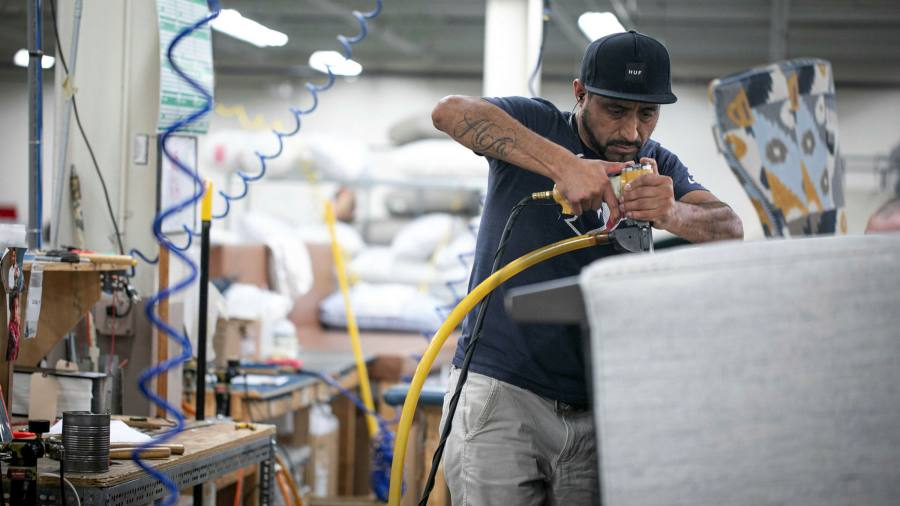Will a weak US jobs report change the Fed’s calculus for July?
US hiring is expected to have slowed in June, as economists bet that higher interest rates, slowing growth and a sharp pullback in stocks will have bitten into labour market growth.
The labour department is expected to report that the US added 275,000 jobs in June, according to a poll by Bloomberg, a step down from the 390,000 added in May. The unemployment rate is expected to remain steady at 3.6 per cent. Average hourly earnings are expected to have increased by 0.3 per cent month over month, also in line with May’s figure.
The Fed has argued that there is room to aggressively raise interest rates because of the strength of the US economy, including the jobs market. Evidence of a slowdown could potentially curb the Fed’s appetite for jumbo rises. Weak data in the US, including Institute for Supply Management manufacturing data on Friday, have helped bring market expectations of Fed policy lower.
The market is currently betting that the Fed’s main rate will be 3.2 per cent by year-end, compared to 3.4 per cent a week ago.
On the jobs report “we are apprehensive even a single payrolls print would materially shift the [Fed’s] thinking,” said Ian Lyngen, head of US rates strategy. What’s more, “the prospect for this to be the month that hiring turns is limited.” Kate Duguid
How high will Turkish inflation go?
While the US and Europe fret about annual inflation approaching 10 per cent, the official rate in Turkey is expected to climb towards 80 per cent when June data are announced on Monday.
President Recep Tayyip Erdoğan’s refusal to allow the central bank to raise borrowing costs — combined with high global commodity prices and a weak lira — has set prices on a seemingly never-ending upward trajectory. Where will it stop? Turkish officials claim that the rate will come down around the start of next year thanks to the numerical impact of high inflation at the end of 2021.
They have also taken steps aimed at curbing credit growth and unveiled savings schemes seeking to prop up the lira. Goldman Sachs predicts that the inflation rate will fall slightly to 65 per cent by the end of 2022. But Per Hammarlund, chief emerging markets strategist at the Swedish bank SEB, warns of the dangers of an alternate scenario.
“I see a great risk that we will see accelerating inflation given that the government is more focused on sustaining growth than containing inflation,” he said. The government’s decision last week to raise the minimum wage for the second time in six months could make the problem worse.
Hammarlund said: “He [Erdoğan] is trying to compensate for the loss of purchasing power but it means you will have inflation ratcheted up. Every time they do this, it feeds into new inflation.” Laura Pitel
Will the Reserve Bank of Australia raise rates?
The Reserve Bank of Australia became one of the first central banks in an advanced economy to move against post-lockdown inflation when it abandoned its yield curve control policy in November last year. In June, it raised its benchmark interest rate by 0.5 percentage points, the most in 22 years.
Despite the policy tightening, the RBA has had to bump up its forecast for headline inflation, which it now expects to peak at around 7 per cent at the end of this year, well above its target range of 2 to 3 per cent. Analysts at Bank of America say that number is still too conservative and that the RBA will move to increase rates by another half percentage point, to 1.35 per cent, when it meets on Tuesday.
Considering the country’s labour market tightness, the bank has ample room to do so, argue analysts at Westpac, who add that a cash rate below 1.5 per cent would remain in the “stimulatory zone”, something noted by the RBA itself in its last meeting minutes. William Langley


